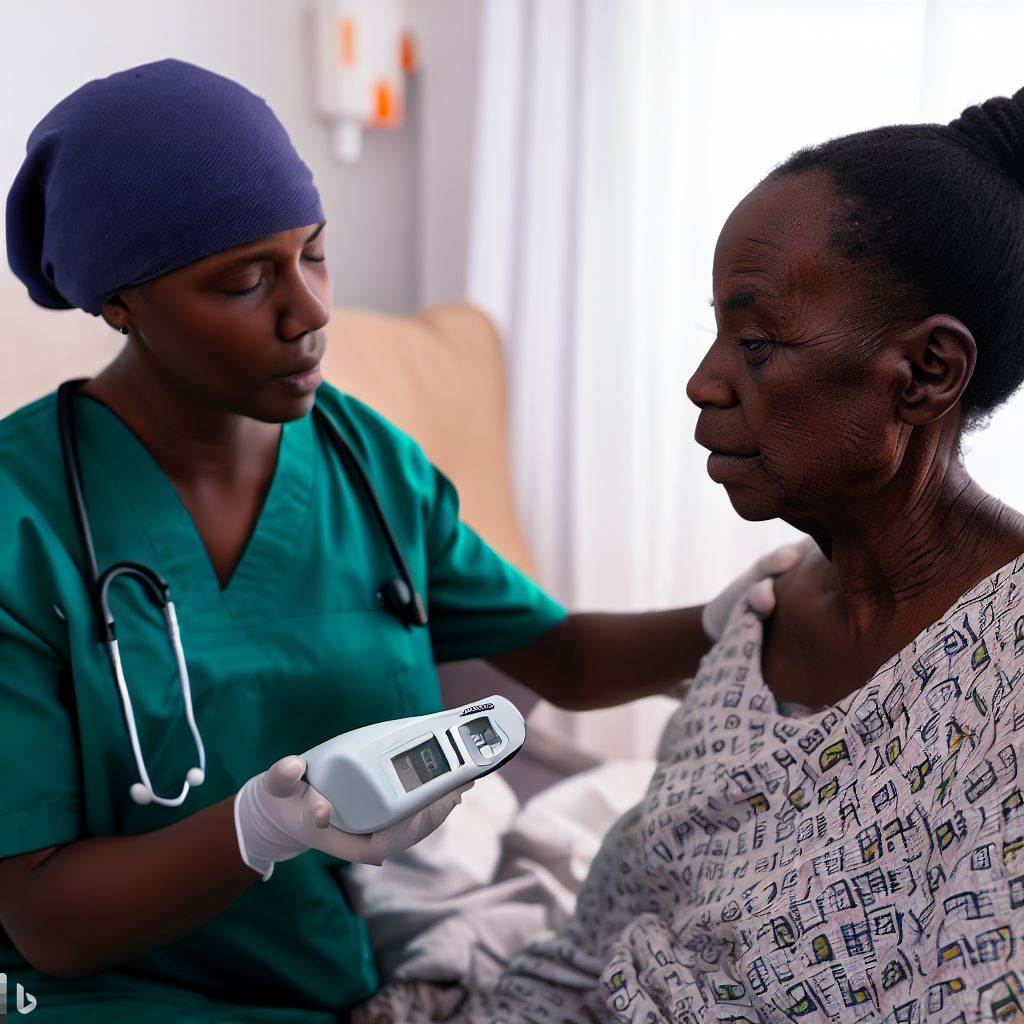Introduction
The impact of technology on home health aide in Nigeria involves providing assistance and care to individuals at home, benefiting from significant technological growth in various aspects of society.
Definition of Home Health Aide Profession
Home health aides are trained professionals who provide essential support and care to individuals in need, typically in their own homes.
Brief Overview of Technology in Nigeria
In recent years, Nigeria has seen a rapid development in technology, particularly in the areas of telecommunications, internet connectivity, and mobile banking.
With the advent of smartphones and improved internet access, Nigerians now have more access to information and services than ever before.
This technological advancement has had a significant impact on the home health aide profession in the country.
One key area where technology has impacted the home health aide profession is in communication.
Home health aides can now use mobile phones and applications to communicate with their clients and healthcare providers more easily.
This has improved efficiency and coordination in providing care, as information can be exchanged promptly.
Additionally, technology has enabled the use of electronic health records, allowing home health aides to access and update patient information more conveniently.
Furthermore, the internet has opened doors for online training programs and resources, enhancing the skills and knowledge of home health aides in Nigeria.
Overall, technology has revolutionized the home health aide profession in Nigeria, enhancing communication, efficiency, and access to resources.
As technology continues to advance, it will undoubtedly play an even more significant role in shaping the future of home health care in Nigeria.
Background of the Home Health Aide Profession in Nigeria
In Nigeria, the home health aide profession is relatively new but rapidly growing in importance. This job involves providing home care assistance to individuals who are ill, elderly, or have disabilities.
Home health aides help these individuals with activities of daily living, ensuring their comfort and well-being.
The role and responsibilities of home health aides are crucial for the overall healthcare system in Nigeria. They are responsible for assisting with personal care tasks such as bathing, dressing, and grooming.
Aides also help with household chores like cooking, cleaning, and laundry. Home health aides play a vital role in promoting independence and improving the quality of life for individuals who require assistance.
They enhance the well-being of patients by offering companionship and emotional support. Additionally, they provide medication reminders and may help with mobility exercises.
The importance of home health aides in the healthcare system cannot be overstated. They serve as a bridge between hospitals, nursing homes, and the patients’ homes.
By providing direct care at home, they contribute to reducing hospital readmissions and easing the burden on healthcare institutions.
Current Status and Demand of the Home Health Aide Profession in Nigeria
In recent years, the demand for home health aides has been on the rise in Nigeria. This is primarily due to the aging population and the increasing prevalence of chronic diseases.
The need for trained and skilled home health aides is expected to continue growing in the coming years.
Currently, the home health aide profession in Nigeria faces some challenges. There is a lack of standardized training programs and certification processes, resulting in variations in the quality of care provided.
Furthermore, the profession is often seen as low-status and poorly remunerated, leading to a shortage of qualified individuals.
To address these challenges and meet the increasing demand, it is crucial to invest in the education and training of home health aides.
Establishing standardized certification programs and providing career development opportunities can enhance the professionalism of the profession in Nigeria.
Home health aides have the potential to play an even more significant role in the healthcare system. With advancements in technology, the profession can be further enhanced.
Tools such as telemedicine and remote patient monitoring can enable home health aides to provide more comprehensive care and connect patients with healthcare professionals.
In fact, the home health aide profession in Nigeria is of utmost importance for ensuring the well-being of individuals who require assistance.
By recognizing the value of this profession and investing in its development, Nigeria can improve the quality of care provided and address the healthcare needs of its growing population.
Read: Patient Rights and Ethics for Home Health Aides in Nigeria
Traditional methods used by home health aides in Nigeria
Home health aides in Nigeria have long relied on traditional methods to provide care to patients.
These manual techniques and processes, while functional, often pose numerous challenges in delivering quality care.
With limited resources and no access to technology, home health aides bear the brunt of these difficulties.
Overview of Manual Techniques and Processes
Home health aides in Nigeria have traditionally relied on manual techniques and processes to provide care to patients.
These include basic medical procedures such as taking vitals, administering medications, wound dressing, and assistance with daily living activities.
When it comes to taking vitals, home health aides use traditional tools like thermometers and blood pressure cuffs.
They rely on their experience and expertise to interpret the readings and make informed decisions about their patients’ health conditions.
Similarly, administering medications involves manual calculations and recording of dosages.
Wound dressing is another area where home health aides exhibit their manual skills. They follow established protocols to clean, disinfect, and dress wounds sustain during accidents or illnesses.
However, these techniques are time-consuming and require precision to ensure proper healing.
Challenges Faced by Home Health Aides without Technology
The absence of technology poses numerous challenges to home health aides in Nigeria.
Without access to electronic health records and online communication platforms, they struggle with coordination and collaboration with other healthcare professionals and families of patients.
The lack of real-time data sharing makes it difficult to provide comprehensive and timely care.
Moreover, the reliance on manual techniques leaves room for human error. Inaccurate readings from traditional tools may lead to incorrect diagnoses and inappropriate medical interventions.
The absence of technology also affects the speed and efficiency of record-keeping, as manual documentation is prone to errors and can be time-consuming.
Impact of Limited Resources on Quality of Care Provided
The limited resources available to home health aides in Nigeria directly impact the quality of care they can provide.
Without access to technology, they struggle to stay updated with the latest medical knowledge and best practices. This knowledge gap can lead to suboptimal care and potentially compromised patient outcomes.
Furthermore, the absence of technology hampers the ability of home health aides to access educational resources and training opportunities.
Continuous professional development becomes challenging, hindering their ability to acquire new skills and improve existing ones.
Additionally, the lack of resources limits the ability of home health aides to utilize assistive devices that can enhance patient care.
Devices such as electronic medication dispensers, remote monitoring systems, and mobile health applications have the potential to improve patient safety and increase efficiency.
The home health aide profession in Nigeria can greatly benefit from the integration of technology.
By harnessing the power of electronic health records, online communication platforms, and assistive devices, home health aides can overcome challenges, improve the quality of care provided, and enhance patient outcomes.
It is crucial for policymakers and healthcare organizations to recognize the importance of technology and invest in its implementation to support home health aides in Nigeria.
Read: Home Health Aide Certification Process in Nigeria
Advancements in technology for home health aides in Nigeria
Introduction to technological tools and devices
Technology has made a significant impact on the home health aide profession in Nigeria.
The introduction of various technological tools and devices has revolutionized the way healthcare services are delivered in the comfort of patients’ homes.
Electronic Health Record (EHR) systems
EHR systems have become an essential part of the home health aide profession in Nigeria.
These systems allow for efficient and secure documentation of patient data, including medical history, medications, and treatment plans.
With EHR systems, home health aides can easily access and update patient information, reducing the chances of errors and improving communication with other healthcare professionals involved in the patient’s care.
Wearable devices
Advancements in wearable technology have provided valuable tools for home health aides in Nigeria.
Wearable devices, such as smartwatches and fitness trackers, can monitor vital signs, track physical activities, and assist in medication reminders for patients.
These devices not only enhance the efficiency of home health aides but also provide real-time data that can be shared with healthcare providers, improving the overall quality of care.
Benefits and opportunities offered by technology in home health aide profession
- Improved communication and coordination with healthcare professionals
- Enhanced efficiency and accuracy in documenting patient information
- Increased access to real-time patient data for better decision-making
- Enhanced monitoring and management of patients’ health conditions
- Integration of telehealth services for remote consultations
- Improved patient engagement and self-management through mobile health apps
Advancements in technology have transformed the home health aide profession in Nigeria, benefiting both caregivers and patients.
Improved communication through electronic systems allows easy collaboration with healthcare professionals.
Technology enhances efficiency in documenting patient information with EHR systems, saving time and reducing errors.
Real-time access to patient data is another advantage. Wearable devices and EHR systems monitor vital signs and track medication adherence, aiding timely interventions.
Telehealth services enable remote consultations and follow-up care, especially valuable for patients in remote areas.
Mobile health apps empower patients to actively manage their health, with caregivers recommending and educating on their usage.
In summary, technology’s integration in the home health aide profession in Nigeria improves care quality, communication, coordination, and efficiency in documentation.
Telehealth and mobile health apps empower caregivers and patients, revolutionizing the profession for better health outcomes.
Read: Benefits and Drawbacks: A Career as a Home Health Aide in Nigeria

Effects of technology on the home health aide profession in Nigeria
Increased efficiency and productivity of home health aides
Technology has significantly increased the efficiency and productivity of home health aides in Nigeria.
With the help of advanced medical equipment and tools, tasks that used to take longer are now completed in less time.
This allows home health aides to attend to a greater number of patients, improving overall healthcare access.
Enhanced communication and continued education
Technology has revolutionized communication in the home health aide profession in Nigeria.
Through teleconferencing and online platforms, home health aides can communicate with healthcare professionals and receive real-time guidance and support.
Moreover, technology enables them to access online courses and training materials, facilitating continued education and professional development.
Improved quality of care and patient outcomes
The integration of technology into the home health aide profession has led to improved quality of care and better patient outcomes.
With the use of electronic health records, home health aides can easily access and update patient information, ensuring accurate and timely care.
Additionally, technology assists in monitoring vital signs and tracking medication schedules, reducing the likelihood of errors and adverse events.
Potential career growth and professional development
Technology opens up new opportunities for career growth and professional development for home health aides in Nigeria.
By mastering technology-driven healthcare devices and software, they can enhance their skills and become more competitive in the job market.
Furthermore, technology enables home health aides to stay updated with the latest healthcare trends and advancements, broadening their knowledge base.
Read: The Role of Technology in Medical Sonography in Nigeria
Challenges and limitations of technology in the home health aide profession
In the field of home health aide profession, technology has brought about numerous advancements that have revolutionized the way care is provided to patients in Nigeria.
However, with these advancements come certain challenges and limitations that need to be addressed.
Lack of accessibility and affordability
One of the major challenges faced in implementing technology in the home health aide profession is the lack of accessibility and affordability.
Many home health aides in Nigeria do not have access to modern technology due to factors such as cost and limited infrastructure.
Furthermore, the cost of acquiring and maintaining technology devices and internet connectivity can be a burden for both home health aides and the agencies they work for.
This limitation hampers the potential benefits that technology can bring to improving the quality of care and efficiency in the profession.
Limited digital literacy and skills among home health aides
Another challenge is the limited digital literacy and skills among home health aides.
Many professionals in this field may have limited or no experience in operating and utilizing technology devices and software for patient care.
This lack of digital literacy can hinder the effective utilization of technology, resulting in a slower adoption rate and reduced overall impact on the profession.
Providing training and support to home health aides can help overcome this limitation and ensure they can fully leverage the potential benefits of technology.
Privacy and security concerns in using technology
Privacy and security concerns are significant limitations when it comes to the use of technology in the home health aide profession.
With the digitization of patient health records and increased usage of communication tools, the risk of data breaches and unauthorized access becomes a major concern.
Home health aides and the agencies they work for must ensure strict protocols and security measures are in place to protect the privacy and confidentiality of patient information.
This requires adherence to legal and ethical standards, as well as the implementation of robust cybersecurity measures.
While technology has the potential to enhance the home health aide profession in Nigeria, there are several challenges and limitations that need to be addressed.
Accessible and affordable technology, digital literacy training, and stringent privacy and security measures are vital in overcoming these challenges.
By addressing these limitations, the home health aide profession can harness the full benefits of technology, leading to improved quality of care, increased efficiency, and better patient outcomes in Nigeria.
Efforts and initiatives supporting the integration of technology in the profession
As technology continues to advance at an exponential rate, its impact on various professions, including home health aide (HHA) in Nigeria, cannot be overlooked.
Efforts and initiatives are being undertaken to integrate technology into the HHA profession, bringing about significant benefits for both caregivers and patients alike.
Government policies and investments
The Nigerian government has recognized the importance of incorporating technology into the HHA profession.
Policies have been established to encourage the use of technology and provide financial incentives for its integration.
Government investments have been made to enhance the availability and accessibility of technology for home health aides.
Training programs and workshops for home health aides
Training programs and workshops are being conducted to familiarize home health aides with the latest technologies.
These programs focus on teaching caregivers how to effectively utilize technology to enhance their caregiving skills.
Home health aides are educated on how to use medical devices, electronic health records, and telemedicine platforms.
Collaborations and partnerships with technology companies
Collaborations and partnerships between home health aide agencies and technology companies are being established.
Technology companies offer their expertise in creating and implementing digital solutions specifically designed for the HHA profession.
These partnerships help in customizing technology to meet the unique needs and challenges faced by home health aides in Nigeria.
Technological tools such as mobile applications and remote monitoring systems are being integrated into daily caregiving practices.
The integration of technology into the HHA profession in Nigeria is revolutionizing how care is provided to patients.
One of the main advantages of technology is improved communication between caregivers and patients.
Digital platforms allow for real-time updates on patient conditions, ensuring timely interventions and reducing the risk of complications.
This facilitates better coordination between home health aides, healthcare professionals, and patients’ families.
Furthermore, technology enables better monitoring of patient health and adherence to treatment plans.
Electronic health records streamline the documentation process, making it easier for home health aides to track patient progress and provide accurate medical histories.
Remote monitoring devices allow for real-time tracking of vital signs, enabling early detection of health issues. Technology also enhances the efficiency and effectiveness of home health aides.
Mobile applications provide a platform for scheduling appointments, managing medication reminders, and accessing educational resources.
This streamlines administrative tasks and frees up time for caregivers to focus on providing quality care to their patients.
Overall, the integration of technology into the HHA profession in Nigeria holds great promise for transforming healthcare delivery.
Efforts and initiatives, such as government policies and investments, training programs, and collaborations with technology companies, are essential in ensuring the successful integration of technology and maximizing its benefits for both caregivers and patients.
Conclusion
In summary, technology has had a significant impact on the home health aide profession in Nigeria.
It has revolutionized the way healthcare services are delivered and has improved the quality of care provided to patients.
This advancement has resulted in increased efficiency, better communication, and streamlined healthcare processes.
The use of technology has allowed home health aides to access patient information quickly and accurately, leading to more personalized care.
It has also improved medication management through electronic records and reminders, ensuring that patients receive the right medication at the right time.
Additionally, technology has made communication between healthcare professionals and patients easier through telemedicine and mobile health applications.
This has facilitated remote consultations, follow-ups, and monitoring of patients’ conditions, especially in rural areas where access to healthcare is limited.
However, there is still room for further development and utilization of technology in the home health aide profession in Nigeria.
There is a need for increased investment in technological infrastructure, training, and support for healthcare professionals.
This will enable them to effectively utilize technology tools and stay updated with the latest advancements.
Furthermore, policymakers and stakeholders should prioritize the integration of technology into the healthcare system to scale up its impact.
This can be achieved through partnerships with technology companies, research institutions, and international organizations.
Lastly, the home health aide profession in Nigeria stands to benefit greatly from the continued development and utilization of technology.
It is crucial to embrace and harness the power of technology to improve access to quality healthcare services for all Nigerians.




